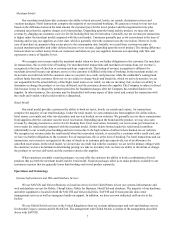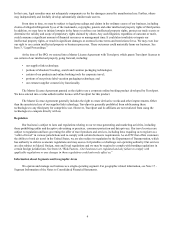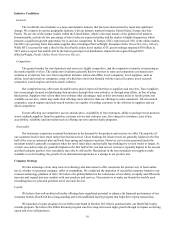Orbitz 2013 Annual Report Download - page 17
Download and view the complete annual report
Please find page 17 of the 2013 Orbitz annual report below. You can navigate through the pages in the report by either clicking on the pages listed below, or by using the keyword search tool below to find specific information within the annual report.17
merger of American Airlines and US Airways, could result in a reduction in the number of airline tickets available for booking
on our websites and increased air fares, which may have a negative impact on demand for travel.
Our business has significant liquidity requirements.
Our business has significant liquidity requirements. Certain events could have a negative impact on our liquidity,
which in turn could affect our ability to take advantage of potential business opportunities, respond to competitive pressures or
operate our business as it currently exists, including the following:
• termination of a major supplier’s participation on our websites;
• decline in merchant gross bookings due to deteriorating economic conditions or other factors;
• decline in stand-alone hotel merchant gross bookings due to a shift from the merchant model to the retail model;
• credit card processors could impose holdbacks or reserves;
• changes to payment terms or other requirements imposed by vendors, suppliers, payment processors, consumer
protection organizations, taxing authorities or regulatory agencies, such as requiring us to provide letters of credit,
cash reserves, deposits or other forms of financial security or increases in such requirements; and
• lower than anticipated operating cash flows from our operations or other unanticipated events, such as unfavorable
outcomes in legal proceedings (including, in the case of hotel occupancy proceedings, certain jurisdictions’
requirements that we provide financial security or pay a deposit to the municipality in order to challenge the
assessment in court).
If any of these events occurs in the future, individually or in the aggregate, they could have a material adverse effect on
our results of operations, our liquidity and the value of our common stock.
We have a significant amount of indebtedness, which could limit the manner in which we operate our business.
As of December 31, 2013, we had approximately $443.3 million of outstanding borrowings under our senior secured
credit agreement. Our substantial level of indebtedness could:
• impair our ability to obtain additional financing or to obtain such financing on terms acceptable to us for working
capital, capital expenditures, acquisitions or general corporate purposes;
• reduce the funds available to us for purposes such as potential acquisitions, capital expenditures, working capital and
general corporate purposes because we are required to use a portion of our cash flows from operations to make debt
service payments;
• put us at a competitive disadvantage because we have a higher level of indebtedness than some of our competitors
and reduce our flexibility in planning for, or responding to, changing conditions in the economy or our industry,
including increased competition; and
• make us more vulnerable to general economic downturns and adverse developments in our business.
The credit agreement requires us to maintain a minimum interest coverage ratio and not to exceed a maximum first lien
leverage ratio. If we fail to comply with these covenants and we are unable to obtain a waiver or amendment, our lenders could
accelerate the maturity of all amounts outstanding under our term loan and revolving credit facility and could proceed against
the collateral securing this indebtedness. If this were to occur, there is no assurance that alternative financing would be
available to us or at favorable terms.
In addition, restrictive covenants in our credit agreement specifically limit our ability to, among other things:
• incur additional indebtedness or enter into guarantees;
• enter into sale and leaseback transactions;
• make new investments, loans or acquisitions;
• grant or incur liens on our assets;
• sell our assets;
• engage in mergers, consolidations, liquidations or dissolutions;
• engage in transactions with affiliates; and
• make any distribution or dividend payment or redeem or repurchase our capital stock.
As a result, we may operate our business differently than if we were not subject to these covenants and restrictions.
We face risks associated with online security and credit card fraud and data privacy breaches.
























